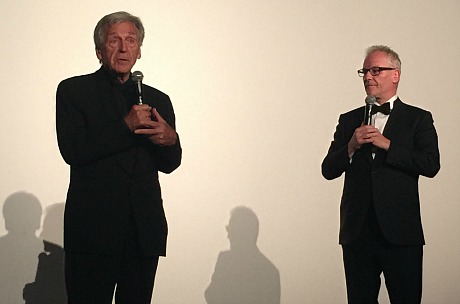 Jeffrey Wells
Jeffrey Wells
Ya Think So, Simon?
Simon Pegg in a Radio Times interview, posted earlier today: “Before Star Wars, the films that were box-office hits were The Godfather, Taxi Driver, Bonnie and Clyde and The French Connection — gritty, amoral art movies. Then suddenly the onus switched over to spectacle and everything changed.
“I’m very much a self-confessed fan of science-fiction and genre cinema. But part of me looks at society as it is now and thinks we’ve been infantilized by our own taste. We’re essentially all consuming very childish things — comic books, superheroes. Adults are watching this stuff, and taking it seriously!”
“It is a kind of dumbing down in a way.” Wells interjection: Kind of? Back to Pegg: “Because it’s taking our focus away from real-world issues. Films used to be about challenging, emotional journeys or moral questions that might make you walk away and re-evaluate how you felt about…whatever. Now we’re walking out of the cinema really not thinking about anything, other than the fact that the Hulk just had a fight with a robot.”
Joe Makes One “For Them”
Just what we need — a Peter Pan origin story. And one, to go by the trailer, that seems to be all about kids, climaxes, whee!, knock your CG socks off. The bummer, in a manner of speaking, is that the director is the great Joe Wright. I’ve been kicking this notion around that Wright decided to direct Pan (Warner Bros., 10.9) to prove to Hollywood that he could play the game — i.e., make a eye-popping, family-friendly blockbuster that’ll make loads of dough — after people started murmuring at parties (and I heard this talk all over the place two and a half years ago) that Anna Karenina was proof that he’d burrowed too far into his precious imaginings, that his tastes were too rarified.
That’s bunk, of course — Anna Karenina may have performed modestly at the box-office but it was a bold stylistic triumph. On 9.2.12 I called it “the first truly breathtaking high-style film of the year, a non-musical successor to Moulin Rouge and a spawn of the great ’70s films of Ken Russell (and by that I mean pre-Mahler Russell, which means The Music Lovers and Women In Love) as well as Powell-Pressburger’s The Red Shoes.” And now Wright, an auteur-level helmer of four stirring films over the last decade — Pride and Prejudice, Atonement, Hanna and Anna Karenina (let’s put aside The Soloist for the time being) — has made a film that’s looking to out-Spielberg Hook?
Wading Through, Making Best Of Sicario
I complained about this last year and I’m complaining again — the sound in the Grand Theatre Lumiere is too bassy and echo-y, and so I struggled to hear the dialogue during this morning’s screening of Denis Villeneuve‘s Sicario (Lionsgate, 9.18). I managed to pick up a stray word or phrase here and there, and when all else failed I relied on nouns and verbs contained in the French subtitles. Listen and read and combine, listen and read and combine…keep trying. The only way I understood complete sentences was from reading the English subtitles when Benicio del Toro spoke Spanish.

After a while I gave up and told myself to just go with the menacing atmosphere and Roger Deakins‘ cinematography and the portions of performances that seemed to occasionally register, and then figure out the particulars later on. Maybe this is a new thing, a way of seducing audiences into seeing films like Sicario twice.
I know that when I watch the Sicario screener on my home system a few months hence I’ll understand every word.
Sicario is basically about heavily militarized, inter-agency U.S. forces hunting down and shooting it out with the Mexican drug-cartel bad guys, and also flying here and there in a private jet and driving around in a parade of big black SUVs. It’s a strong welcome-to-hell piece, I’ll give it that, but Sicario doesn’t come close to the multi-layered, piled-on impact of Steven Soderbergh‘s Traffic, which dealt with more or less the same realm.
The tale, such as it is, is told from the perspective of Emily Blunt‘s FBI field agent, who of course is stunned and devastated by the unrelenting carnage blah blah. One of her battle-hardened colleagues, a senior veteran with a semi-casual “whatever works, bring it on” attitude, is played by the ever-reliable Josh Brolin. My favorite character by far was Benicio del Toro’s Alejandro, a shadowy Mexican operative with burning eyes and his own kind of existential attitude about things. Blunt’s partner is played by Daniel Kaluuya, and I’m telling you here and now and forever I didn’t understand a single phrase from this guy.
Character, Crackerjack, Insistent
I asked yesterday if anyone could share a PDF of Aaron Sorkin‘s Steve Jobs script; thanks to the four readers who did. I’m only through Act One, or page 58 out of 178, but it’s like riding the rapids, this thing. You just tear through it. No specifics but like the just-surfaced teaser it reminds you of The Social Network — the story of a brilliant dick who’s consumed by the urgency of his mission and a sense of absolute certainty that he’s a bringer of profound innovation, and either you’re with him or you’re not. He’s no sweetheart but what a character — the Napoleon Bonaparte of Silicon Valley. I love it so far. Delicious theatre. The performances are going to sing, particularly those from Michael Fassbender (despite concerns that he doesn’t resemble Jobs), Kate Winslet, Seth Rogen, Jeff Daniels, Katherine Waterston.


I decided to settle back and catch a 7 pm Salle Bunuel screening of Z, the 1969 Costa Gavras classic. He attended and introduced. I own the Bluray but I wanted to re-experience it with an audience. I’m glad I did. The finale — the epilogue, I mean — is such a knockout.

Deadpan, Exquisite Framing
“Why would anyone write about a Roy Andersson film? You might as well dance about a cake. The Swedish director’s Living Trilogy, which began 15 years ago and concludes with this sublimely ridiculous piece of filmmaking, stands apart from the rest of cinema at such a remove that trying to make sense of it in words is beside the point, and perhaps impossible.
“You just have to watch it, then grab a net and try to coax your soul back down from the ceiling.
“Imagine Jacques Tati stuck in Ingmar Bergman’s spare room and you can just about start to picture the strangeness of A Pigeon Sat on a Branch Reflecting on Existence — the winner of the Golden Lion at last year’s Venice Film Festival and one of the very best films you can see this year.” — from Robbie Collin‘s five-star Telegraph review.
Inside Out: Clever, Adult-Level, Peppy, Not My Cup
The praise being heaped upon Pete Docter‘s Inside Out (Disney, 6.19) is correct. It’s very fast and clever and superbly rendered. And surprisingly, even head-spinningly complex at times, which is to say adult-friendly. And rather touching at times. I was impressed, engaged and amused as far as it went, given my general loathing for animation. Docter and his team take a wowser idea — comedically depicting the push and pull within the head of Riley, a 10 year-old girl, that lead to various emotional states — and make it come alive with ingenious writing, animation and voicing. Riley’s every waking moment is processed and responded to by five primal instincts — joy, fear, anger, disgust (or what I prefer to call aesthetic distaste, which you need in order to develop good taste…just ask Francois Truffaut) and sadness. It’s a very fine film for what it is, and I have nothing to say against it except that I didn’t have a very good time watching it, but that’s me. I just can’t stand the broad, relentlessly peppy energy that family-friendly animation necessarily traffics in, and that’s fine. Some are calling Inside Out Pixar’s best ever, which all but assures a Best Animated Feature Oscar nomination and very possibly a win nine months hence. Let it go at that.
Consciousness Warp
I realized a few minutes ago that I’m either losing or have altogether lost the ability to process life on its own terms, or at the least that a tendency to absorb things from my compulsive columnist perspective is gaining the upper hand. From my bedroom window I was checking out a view of Cannes’ Old Town (i.e., “Le Suquet“) and the radiant blue sky and the rooftops with their century-old clay tiles, bathed in the bright afternoon light. As good as it gets. And then I tapped the windowsill with my left thumb. Yes, I’d just tried to zoom in on the view by tapping my Apple trackpad. Had to laugh.

Bombs Is A Bust
To me Joachim Trier‘s Louder Than Bombs, an ennui-laden, Euro-style Ordinary People stuffed with the usual suburban, middle-class downer intrigues and featuring one of the most reprehensible teenaged characters in the history of motion pictures, felt contrived and gently infuriating. Too many aspects felt wrong and miscalculated or even hateful, and once the tally reached critical levels I began to sink into my usual exasperation (faint moaning, leaning forward, checking my watch).
“Uh-oh, this isn’t working,” I began saying to myself at around the ten-minute mark. Later on I was saying, “Wow, this really isn’t working.” Later on I was muttering worse things.
Bombs is basically about a father and two sons grappling with the death of their wife/mother, and the dysfunctional behavior that emerges in her absence. Dad, a Long Island-based high-school teacher, is played by aging, overly sensitive, watery-eyed Gabriel Byrne. Son #1, a mild-mannered college prof and mystifyingly irresponsible young dad, is played by Jesse Eisenberg, wearing a bizarre straight-hair wig instead of his usual curlies. Son #2, the above-mentioned demon from Hades, is played by Devin Druid. Isabelle Huppert plays the dead wife/mom — a renowned, N.Y. Times-endorsed war photographer who died some months ago in a local highway accident.
I found the various choices, behaviors and mannerisms of the three males so irritating that my mantra quickly became “I don’t want to know about your dysfunctional response to the death of your wife/mother, get over it…I don’t want to know about your dysfunctional response to the death of your wife/mother, get over it,” etc.
If Someone Has a PDF of Sorkin’s Steve Jobs Script…
I’m re-reading that hacked Sony email written by Sony marketing exec Michael Pavlic about Aaron Sorkin‘s Steve Jobs script: “It’s brilliant. It’s perfect. There are marketing liabilities. It’s long, it’s claustrophobic, it’s talky, it could be a play, it risks being all one medium close-up, it’s periody…a mediation on Jobs himself. It’s insistent upon itself, it’s relentless. I kept begging for someone to walk outside, for some daylight, for an opening.
“But Sorkin is so brilliant with the structure. Of course, at the film’s end he gives you that break into the parking lot. A convenient door to a different world. Just when Jobs lets up, the script finally breathes for the first time. It’s really spectacular. All obvious stuff but I’m a sucker for layered, thoughtful filmmaking. I believe it will be brilliant. This is the kind of film that makes me thankful for movies, and they’re few and far between these days.”
Did Weiner Blow Mad Men Finale, Or Was It…Well, Not Bad?
It’s 9:20 am in Cannes, and I don’t see the final Mad Men episode on my iTunes feed. (It’ll show up sometime today.) I’m therefore in no position to talk, but so far the general reaction seems to be one of mild dismay. Nothing close to Sopranos-level befuddlement but something along the lines of “uhm…that’s it?” Yes, I’ve been watching the series all the way through and I know that Matt Weiner has never been one to whip up a story lather. It’s not in him. But most of us wanted, in the words of Eddie Felson, some kind of “nice clean pocket drop.” Was “Person to Person” that?

Tomorrowland In Trouble?
From Justin Chang‘s Variety review: “In his Pixar triumphs The Incredibles and Ratatouille, writer-director Brad Bird proved himself not just a wizardly storyteller but also an ardent champion of excellence — of intelligence, creativity and nonconformity — in every arena of human (and rodent) accomplishment. All the more disappointing, then, that the forces of mediocrity have largely prevailed over Tomorrowland, a kid-skewing adventure saga that, for all its initial narrative intrigue and visual splendor, winds up feeling like a hollow, hucksterish Trojan horse of a movie — the shiny product of some smiling yet sinister dimension where save-the-world impulses and Disney mass-branding strategies collide. A sort of Interstellar Jr. in which the fate of humanity hinges on our ability to nurture young hearts and minds, the picture runs heavier on canned inspirationalism than on actual inspiration.”
From Todd McCarthy‘s Hollywood Reporter review: “How many sci-fi/fantasy films of recent years have climaxed with anything other than massive conflict and conflagration? Whatever the number, Tomorrowland is one of the few to place far more emphasis on talk than action, which is what will probably contribute to what, for some, will make for a softer experience than the genre norm. The film’s general coolness and vision of a potentially serene future reminds more of Spike Jonze’s Her than of anything in the Marvel, George Lucas or James Cameron-derived worlds, not to mention other far more violent ones. As thoughtful and sympathetic as the intentions are here, perhaps it all goes back to the point often made about Dante; what do people read and remember, Paradiso, Purgatorio or Inferno?”
